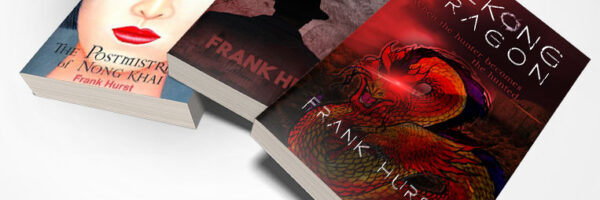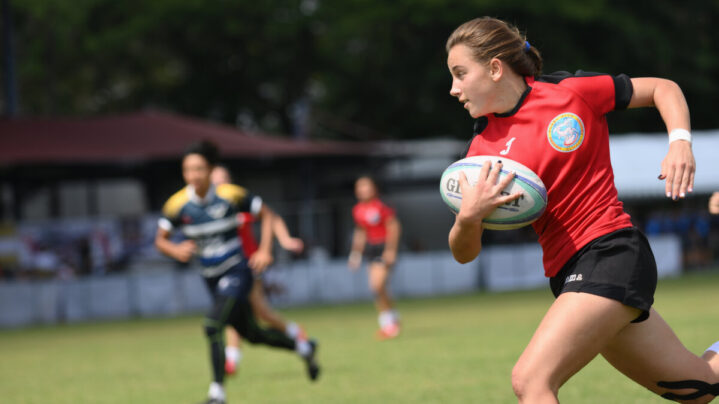
Women and odd-shaped balls
The popularity of rugby skyrockets as more and more girls play at the Bangkok International Sevens
As you pick up this edition of Expat Life, the World Cup will be in full swing. The rugby version, that is, in Japan.
If you are into sport, you may know that already. If not, you just might need to be informed that – behind only the soccer cup and the Olympics – the Rugby World Cup is the third biggest sporting event on the planet, and that the Japanese are quite good at it, demolishing the myth that rugby is only played “by huge men with odd-shaped balls”, as the risqué traditional joke has it. The final is on November 2, giving us a few days to regain our breath before a local version takes place: the 23rd annual Bangkok International Sevens (November 9-10 at the superb Patana School Sports Complex on Soi Lasalle), a less bruising, more laid-back alternative that makes an ideal family weekend outing.
In addition to the men’s tournaments – elite and social – there will be a women’s tournament and sections for under 18 and under 16 boys, the latter reflecting the large number of local and international schools that choose rugby as a sport. Since its launch in 1995 the event has become an established favourite with Thailand expats, cheering on their favourites or just soaking up the action, and a large local contingent will also attend, mirroring the rising popularity of rugby in its many forms. The World Cup features 20 of the top countries (pre-event favourites are New Zealand and South Africa) all playing 15 a side, with matches lasting a lung-bursting 80 minutes. Sevens is more spectator-friendly, especially for the non-expert, with matches lasting seven or ten minutes per half, and in Bangkok matches take place on multiple pitches, to enable organisers to complete the large number of round-robin games and also provide the crowd with plenty of quick-fire action.
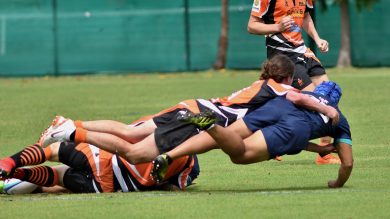
The Patana complex enables three full pitches plus a practice/warm-up area, so everyone seated in the shade of the main grandstand gets a good view of the action, while immediately behind the stand will be an appetising array of browsing-and-sluicing options for all tastes. Patana’s pitches are the best in SE Asia, without doubt – properly grassed for good traction and with amazingly good drainage. One of a number of formats of rugby (others include 10s and touch, a non-contact version), sevens provides an ideal combination, for both players and spectators, of speed and physicality, ensuring never a dull moment. Sevens has become stunningly successful throughout Asia, with World Series events in Singapore and Japan supplementing the Hong Kong Sevens, the granddaddy of them all, as well as more club and social-oriented events in even the most unlikely places.The Bangkok event has drawn entries from Oceania to Scotland, from the USA to Dubai and South Africa, 24 countries in all, with Thailand a drawcard for its tourist attractions to back up the quality of the rugby on offer. But the real focus remains the SE Asia region.
Tournaments have focused international attention on Thailand as a rugby destination where the fun and excitement of Thai culture mixes with the full-on pace and fast action of sevens rugby. Now, however, the focus is shifting towards a higher level of sevens participation. In this region, Malaysia has the upper hand in rugby at present, its men’s 15 team retaining Asian Division One status and a whopping 27 world ranking places ahead of Thailand, which languishes in Division Two. But a new regime at the Thai Rugby Union is promising to put an end to stories of corruption and cheating that have dogged it for years, and has made a start by taking seriously the qualification (both men and women) for the Olympic Sevens at the Tokyo 2020 Games; those qualifiers will be part of the SEA Games in the Philippines from November 30 and the two squads have been training hard in New Zealand in preparation.
Another positive sign is the appointment of Fiji-born Lote Raikabula as director of rugby. Lote, 36, is a former All-Black, a star of New Zealand’s World Cup Sevens-winning team. His fitness and enthusiasm, together with his trademark wide smile, have been warmly welcomed in the Kingdom. Despite occasional appearances, rugby is no more “dangerous” than any other contact sport (despite the famous comment from a former coach of the then world champions South Africa that “ballroom dancing is a contact sport – rugby is a collision sport”). Nevertheless, all referees are properly qualified and at Patana, where there is a fully-equipped medical room in the complex, a specialist team and ambulance from a top Bangkok hospital will be on standby throughout the event, although in past years their ministrations have been mainly to spectators with mishaps. So why not turn up and sample this exciting spectacle – with free admission and even a free shuttle service from the nearest skytrain station! Up-to-date information on the programme will appear on Expat Life’s website in the week before the event, which kicks off with a dinner on November 8 for all competitors at the tournament’s ‘home’ hotel, the Bangkok Hotel Lotus Sukhumvit on Soi 33.
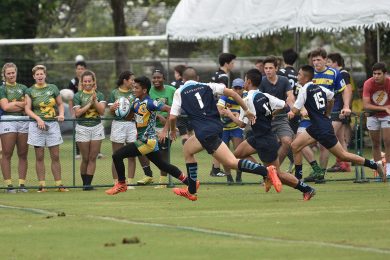
WHERE: Bangkok Patana School Sports Complex, Soi Lasalle (Sukumvit Soi 105)
WHEN: November 9 and 10. Start 0900; matches throughout the day with lunch break
WHO: rugby sevens teams from all over the region: men’s elite, men’s social, women’s,
under 18s and under 16s
HOW: free entry; parking available at the school; complimentary shuttle bus service
from/to BTS Bearing
WHY: great family day out – seating, shade, lots to eat and drink
(please don’t bring your own it’s a school,remember), exciting sport in a fantastic setting
WHAT: more details, latest news of entries, and running order at: www.bangkoksevens.com
David Adamson, tournament director, explains the event’s growth:
The Bangkok International Sevens has become a firm favourite in the regional sporting calendar. We attract elite teams from rugby giants like New Zealand and Australia, but we also favour local input. Teams from the poorest parts of Thailand have travelled, with our joint support, to play in the youth divisions. We have put local promising Thai players with the international teams, such as the Pacific Warriors from New Zealand, and these boys have gone on to make national teams after being seen at the tournament. We are hoping to get a team from Myanmar in a forthcoming event. For several years now we have been fortunate to enjoy the partnership of Hart Innovations, a British company leading the field of blood diagnostics. Hart’s managing director Albert ‘Alby’ Pattison is a great enthusiast, very hands-on, and this sponsorship has enabled me and my team to attract some of the best club teams from around the world to play to showcase Rugby Sevens while developing the sport among the poorer and less rugby-skilled nations of Asia.
As an example of the success of this policy, teams from Laos attend and we have seen their players and coaches develop. With our support, the Vientiane Lions team has been able to come to the event: in their first year they won one game, last year they won the women’s tournament. Last year, for the first time, a women’s team travelled from Cebu in the Philippines, not a rugby hotspot. All-Thai women’s teams have entered for many years and have won their section seven times. Without such enthusiastic support from Hart Innovations, we would not have been able to develop these teams and the tournament to the level it is today, and as ever I thank Alby and his team – it is very much appreciated! The organising team comprises a large number of local and expat volunteers, some of them helping on the pitch on the day and many others working hard throughout the months between events, because a tournament like this doesn’t just happen overnight! The effort has been worthwhile, however, and a source of personal satisfaction as we continue to grow rugby throughout Asia and break down barriers with our combined strength to empower people in these developing nations.”
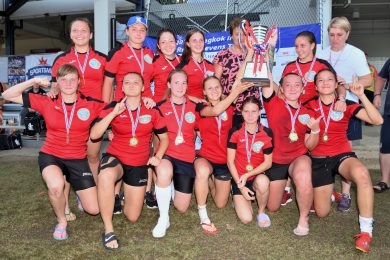
Women’s rugby It’s symbolic of the astonishing growth in popularity of women’s rugby that the world governing body has just announced its men’s and women’s world cup competitions will from next year have equal billing. This announcement follows the unveiling of World Rugby’s ‘Women in Rugby’ campaign which was launched in May in partnership with member unions to drive greater growth and investment in the women’s game. Participation rates across 15s and sevens are rising at an estimated 500,000 new players per year globally. According to World Rugby, women’s rugby is growing as fast as or even faster than men’s rugby and it is estimated that by 2026, 40 percent of global rugby players will be female. Although it remains mainly amateur, women’s rugby is now played in more than 80 countries – including Vietnam, Laos, Cambodia, Malaysia as well as Thailand.



